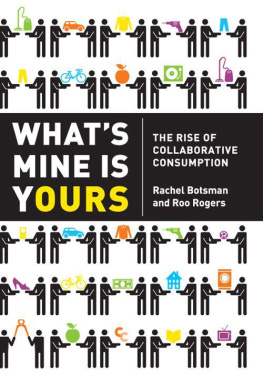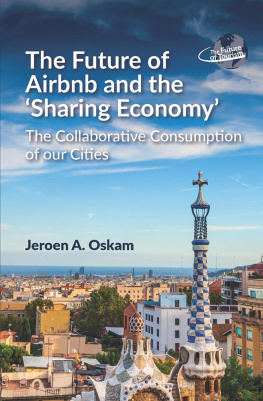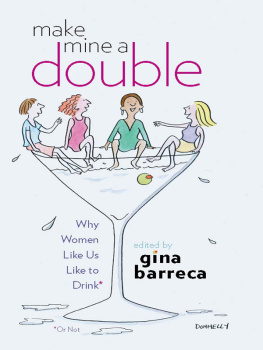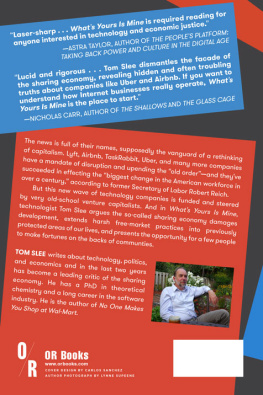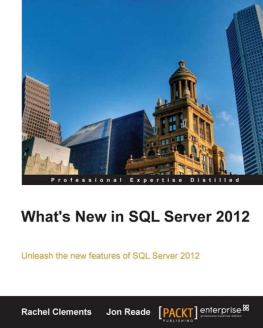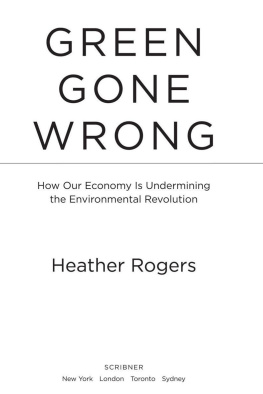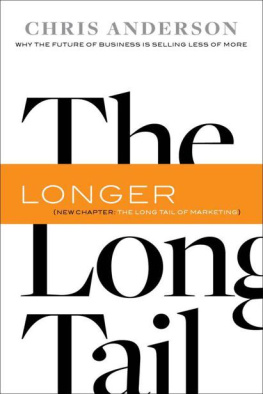Introduction
Whats Mine Is Yours
In October 2007, designers from all over the world traveled to San Francisco to attend the annual industrial design conference. The citys hotel rooms had been sold out for months. Joe Gebbia and Brian Chesky, old friends and product design graduates from the Rhode Island School of Design, were among the ten thousand people planning to attend. The classmates had recently moved into a big loft in South of Market, San Francisco, or SoMa, as it is known, to start a business. During a conversation Gebbia and Chesky had about making some quick money to help pay their rent, they asked themselves, Why not rent our extra room and advertise it on the conference Web site? They did, and made close to $1,000 in just one week.
Chesky and Gebbia thought that people in their twenties would respond to their offer. Three people ended up staying: a male designer from India who read about the idea on a local design blog and who saw it as a great way to meet new people; a thirty-five-year-old woman from Boston who thought it was a better value than a hotel; and a forty-five-year-old father of five from Utah. It completely blew away our assumptions, Gebbia recalls. The friends were also surprised that they didnt feel like they had strangers in their own home. They are strangers until you have a conversation with them, Chesky explained.
Convinced they could start a business matching visitors who wanted rooms with locals who wanted to rent out extra space, Chesky and Gebbia, joined by Nathan Blecharczyk, a close friend and Web developer, built a simple Web site in early 2008. They initially thought of the idea air beds for conferences solely for large events such as the Republican and Democratic conventionswhere hotels were unavailable because they were sold out or unaffordable. When Obama announced he was speaking in a 75,000-seat arena, and there were only 40,000 hotel rooms in Denver, the math just really worked in our favor, Chesky recalls. Their Web sites traffic grew. They appeared on CNN and in the pages of the New York Times and the Wall Street Journal. During the first few months of the launch, the trio was surprised by both the number and the mix of people wanting to rent out space as well as by the diversity of travelersfamilies, newlyweds, students, and even businessmenwilling to pay for a rented room.
Chesky, Blecharczyk, and Gebbia realized that conferences were just a narrow slice of the larger market. On the whiteboard in their apartment, they drew a spectrum. On one side they wrote hotels and on the other they scribbled rental listings such as craigslist, youth hostels, and nonmonetary travel exchanges such as CouchSurfing that help people travel by creating a network of couches available to sleep on for free. In the middle was a big white space, an untapped market: people looking for reasonably priced accommodations with the added benefit of a local experience. They were, however, wary that this opportunity appeared so large and untapped for a logical reasontrust.
Was the act of attending the same event, whether a political rally, a music festival, or a design conference the critical factor in building trust between strangers? Would people stay with one another if they just shared an interest such as photography? What about if they were alumni who had graduated from the same university? Was it possible to create an entirely open peer-to-peer marketplace for people to stay anywhere around the world? These were questions the three men chatted about for several months before agreeing that the answer could be yes to all of the above. The success of other matchmaking services such as eBay indicated that trust could be built. By August 2008, Airbnb.com, their companys Web site, was born. The name came from the idea that with the Internet and a spare room, anyone can become an innkeeper, explains Blecharczyk.
In April 2010, Airbnb.com had nearly 85,000 registered users, with more than 12,000 properties across 3,234 cities in more than 126 countries. Just as eBay is for goods, the site is a diverse marketplace for spaces. Listings include everything from a Charming studio in Bastille, Marais for $90 a night, to a Harlem Haven Private Apartment, New York for $120, to an entire villa in the Bophut Hills in Koh Samui, Thailand for $275 per night. Chesky marvels, When we started I never thought people would be renting out tree houses, igloos, boats, villas, and designer apartments.
For the most part, the people and places are not vetted, inspected, or interviewed by Airbnb. Its up to users to determine if they want to host a guest or if they want to stay with someone based on kaleidoscopic photos of the property, detailed profiles, and other users reviews. As the site has grown, in fact, the founders have removed rules they initially thought would be required. They took away the initial cap on charges of $300 because they realized that people were using the Airbnb community for far more than budget accommodation. Today you can find castles for rent in England for $3,000 a night. The only fixed rules on Airbnb are that the travelers must be able to ask the host questions before they book, and rooms cant be a commodity, which excludes most hotels. A Marriott in New York City and a Marriott in Ireland will look exactly the same, Chesky says. And you dont know what room you are getting or even what floor you are on. We are providing the opposite.
Blecharczyk has since moved with his wife to a bigger apartment in Palo Alto. In January he made $1,200 from renting out their extra bedroom via Airbnb to three different individuals for a total of fifteen days in January 2010. When the founders launched, they didnt consider that the service would enable people to use their spare space as an investment, and not a liability. Some users have an extra bedroom in an expensive neighborhood, so why not rent it out every now and again? Angela Rutherford moved into a large two- bedroom loft in New Yorks financial district. After having previously lived alone, she was hesitant about sharing her room with a full-time roommate. Instead, she decided to furnish the spare room and rent it out on Airbnb for about fifteen nights per month. I can control when Im sharing the space and when Im not, she explained. I use the extra cash to help pay off my credit card debit, and it covers about half the rent.
The motivation for hosts using Airbnb is typically a blend of making extra money and meeting new people. The children of Jill Banounou from Denver went to college: I have an empty room now and its interesting to have people every once in a while. Stephanie Sullivan from Pittsburgh needed extra money to help pay for the maintenance on her 110-year-old home and loves having people stay. Matthias Siebler from Boston used the money to pay for an entire trip to England so he could attend an old friends wedding. Sandra Bruce from Washington is hosting to save for my retirement. I also like having the company. Some people have started their own business with the extra money; for others it has helped them keep their home.
In January 2010, the team received this e-mail from a woman named Kendra Mae Tai, a host in New York City: Hi Airbnb, I am not exaggerating when I tell that you literally saved us. My husband and I just married this past May after losing both of our jobs and our investments in the stock market crash last year. We slowly watched our savings dwindle to the point where we did not have enough money to pay our rent. At that point, I listed our apartment on your Web site and received so many requests.... You have given us the ability to keep our home and travel together and the peace of mind of knowing we can make it through this challenging time in our life. Thank you so much.

